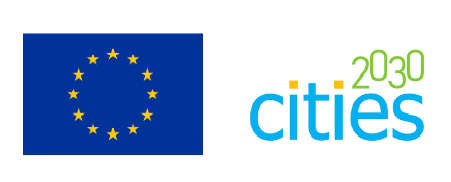Co-creating resilient and sustainable food systems towards FOOD2030 (CITIES2030)
| Title | Co-creating resilient and sustainable food systems towards FOOD2030 |
| Abbreviation | CITIES2030 |
| Project number | 101000640 |
| Programme | Horizon 2020 |
Project partners
- Ca’ Foscari University in Venice (Italy) (lead partner)
- EPC European Project Consulting (Italy)
- Bruges (Belgium)
- VIVES University of Applied Sciences (Belgium)
- İstanbul Avrupa Araştırmaları Derneği (Turkey)
- Inagro (Belgium)
- University of Nicosia Research Foundation (Cyprus)
- Development agency of the City of Velika Gorica – VE-GO-RA (Croatia)
- Inventive solutions d.o.o (Croatia)
- Vejle Municipality (Denmark)
- Quantitas (Italy)
- Into Seinäjoki Ltd. (Finland)
- ProAgria Rural Advisory Centre South Ostrobotnia (Finland)
- Smart & Lean Hub Oy (Finland)
- City of Bremerhaven (Germany)
- Technology Transfer Consortium – ttz Bremerhaven (Germany)
- Biozoon food innovations GmbH (Germany)
- Municipality of Quart de Poblet (Spain)
- “Social Innolabs Foundation” (Spain)
- Technical University of Madrid (Spain)
- Waterford Institute of Technology (Ireland)
- Matis Ltd. (Iceland)
- Future Food Institute (Italy)
- Vidzeme Planning Region (Latvia)
- Latvian Rural Forum (Latvia)
- Green Growth Platform (Macedonia)
- AgFutura Technologies (Macedonia)
- City of Iasi (Romania)
- Romanian Academy – Iasi Branch (Romania)
- ITC – Innovation Technology Cluster Murska Sobota (Slovenia)
- Correlate (Norway)
- Municipality of Vicenza (Italy)
- VU Foundation (Stichting VU) (Netherlands)
- Municipality of Murska Sobota (Slovenia)
- University of Luxembourg (Luxembourg)
- Cyprus Union of Communities (Cyprus)
- Primelayer (Portugal)
- IUAV University of Venice (Italy)
- Riga Technical University (Latvia)
- La Cité de l’agriculture (France)
- City of Haarlem (Netherlands)
Project objectives
- Identify and map short food supply chains in the region, by identifying small and medium-sized producers, processors, consumers, actors of the food logistics stage, involved NGOs and public organizations.
- Involve the local community to identify its needs and opportunities towards a sustainable food system.
- Identify the best practices (CITIES2030 partners) for regional food ecosystems and short food supply chains, identify challenges at regional, national, and international levels, select and adapt best approaches for testing in the region.
- Develop and test new methods and tools to establish and strengthen sustainable regional food ecosystem of short supply chains in close cooperation with local communities.
- Prepare and make recommendations to state institutions and local governments to better align their strategies, plans, and actions with the guidelines of the EU strategy “FOOD 2030”.
Activities
- Establish living and policy labs to achieve and promote the involvement of local producers, processors and other stakeholders in the development of the regional food ecosystem.
- Increase the awareness, involvement, and knowledge of local people about the importance of a sustainable food ecosystem and the role of individuals and communities in it.
- Support the development of short food chains by promoting the consumption of local products, cooperation of catering service providers, retailers with local producers, processors, promoting the increase of the share of regionally produced products in the assortment.
- Improve policies, strategies, action plans, and regulations to support the development of sustainable and lasting food ecosystems at regional and national levels.
Results
- A sustainable public procurement mechanism tailored to the needs of sustainable and lasting regional food chains has been established.
- Smart villages and cities (local initiatives) have been set up to promote the development of short food supply chains, various forms of cooperation, and positive changes in the consumption behavior of citizens/consumers.
- There is a public-private partnership that creates systematic change in existing and apparent food chains in the regions.
- Developed and tested innovative/new business models, production, storage and delivery solutions.
Budget
Total: 12 513 955,75 EUR
VPR budget: 184 300 EUR
EU funding programme: 184 300 EUR
Implementation period
1.10.2020.-30.09.2024.
Contacts
Lienīte Priedāja-Klepere
Phone: +371 26133028
E-mail: lienite.priedaja@vidzeme.lv

